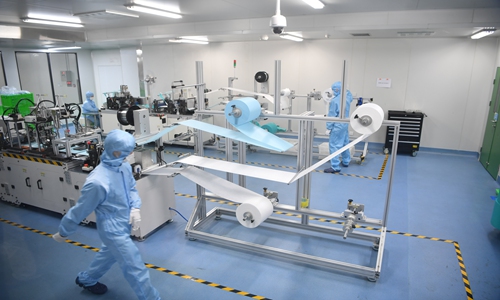Face mask factories turn down new orders as raw materials run out
By Yin Yeping Source:Global Times Published: 2020/4/16 18:13:40

Photo: cnsphoto
Shortage of raw materials for making face masks is pushing factories to turn down new orders, and the dire situation is expected to ease in a month if the spread of the coronavirus pandemic overseas can be contained properly.Dongguan Hendar Cloth Co found themselves in a difficult situation as some mask producers are making advance payments to secure deals for its materials. But the plant is not happy, because it simply cannot manufacture enough cloth to meet market demands.
Demand for mask raw materials has soared since the global outbreak began, and the factory has postponed deliveries of orders that were meant to be completed in a two month period, said an online statement of the company.
The company stopped taking new orders from April 1 and discussed with some of its clients about refunds. However, new orders are still pouring in, and that is annoying. "If the refunds are still transferred back to us, we will report it to the market supervision bureau or the police," the company said in its statement.
The company's "predicament" is resonating well with social media.
Many expressed admiration for the company, saying it is hard to understand a business that refuses to accept advance payments from its clients. But others took the side of the company. "If it signs a contract or receives advance payment, it could face legal action if the plant fails to deliver on the contract on time," one netizen said.
The Global Times reporter reached the company seeking a comment, and the plant replies that they are too busy with materials production, and cannot find time to reply media questions.
Bai Yu, president of the Medical Appliances Branch of the China Medical Pharmaceutical Material Association (CMPMA), told the Global Times on Thursday that the Guangdong factory is not alone since there are hundreds of thousands of mask production plants forced to shut down after raw materials dried up.
"From January until March, there had been a mushrooming of mask factories, driving up demand for raw materials such as melt-blown fabric in China," Bai said, adding the shortage of melt-blown fabric had appeared in late March since many exporting countries including Turkey and Russia have seen a surge of COVID-19 cases.
The Ministry of Commerce, the General Administration of Customs and the National Medical Products Administration issued a notice on orderly export of medical materials on March 31, tightening supervision of production. Meanwhile, the government's crackdown on unlicensed small mask factories has intensified, leading to the closure of many of them, including those making raw materials.
"The state cracked down on quality issues at the small factories, which led to many face mask plant closures," Bai said. And, non-woven fabric, needed for masks making, are in scant supply too.
"Many exporting countries of mask components including Germany are in the midst of the pandemic, which has added to market supply crunch," Bai said.
RELATED ARTICLES:
Posted in: INDUSTRIES,MARKETS